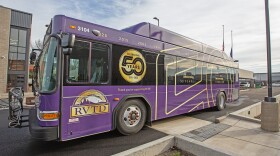-
Joining the Exchange are Belinda Brown, Director of Tribal Partnerships at the Lomakatsi Restoration Project and Dave Lewis, PhD. Dave is an assistant professor of anthropology at Oregon State University.
-
-
Oregon, Washington officials say they’ve spent millions removing or destroying abandoned vessels
-
Youth descend a free-flowing Klamath River after biggest dam removal project in history.
-
A program in Southern Oregon gives high school students hands-on experience in ecological restoration. Despite federal funding challenges, the program has thrived this year.
-
Oregon lawmakers have passed a pair of bills to enable “microgrids” within the larger power system.
-
The Board of Forestry has long had the power to hire and fire the state forester. Then lawmakers passed a bill transferring that authority to the governor.
-
Nearly all of the workers responsible for cleaning 272,000 pounds of garbage off Oregon highways have lost their jobs after lawmakers failed to pass a transportation spending package.
-
With federal funding restricted due to Oregon’s status as a sanctuary state, Jackson County’s public transportation provider is slashing services to make ends meet.
-
Clean-energy projects have new deadlines for federal tax credits and limits on foreign parts, taking aim at California’s climate agenda. Eleven major solar projects and one onshore wind project now face potential delays or cancellation.
-
As California enters the height of wildfire season, Cal Fire aircraft are once again painting red lines across dry hillsides with a substance known as PHOS-CHEK. The fire retardant is used to slow or stop advancing flames. But growing questions about its safety for the environment and for people are prompting scrutiny.
-
Oregon transit agencies have announced they are reducing service due to the funding uncertainty caused by an ongoing legal dispute between Oregon and the Federal Transit Administration.
-
Under the Trump Adminstration's One Big Beautiful Bill, Oregon could lose about 4 gigawatts of planned wind and solar energy, or enough energy to power one million homes.
-
With 7 of its most ambitious rules for cars, trucks and trains repealed, California officials now must find new ways to clean up the nation’s worst air pollution. But officials face growing pushback about affordability and costs.















